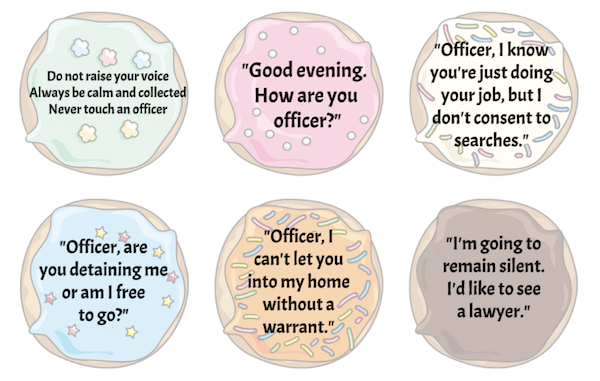USA: What to do if you’re stopped by the police
USA: What to do if you’re stopped by the police
Disclaimer: I am not a lawyer!The Oh Shit moment
When I was 5, I saw the Karate Kid. I saw that bad guys could beat me up, and I had no recourse if I didn't know karate. I promptly signed up for martial arts classes.
I had a similar moment a few years ago, when I saw this video of police lying to someone they pulled over. The police try to say that it is against the law to film the police. Turns out that was a lie, and fortunately the person they were lying to was a lawyer, and knew that.
Police are allowed to lie to you
According to law firm Roth Davies:
- Officers can lie and claim not to be police.
- They can lie during interrogations and say, 'Your friend already gave you up, so you might as well come clean.
- They can lie and say it's off the record.
- They can lie and say, “We’ll put a good word in for you with the judge.”
- They can have you write an "apology letter", but it will get treated as a confession in court.
Although the police are allowed to lie to you, it should go without saying that you cannot lie to the police.
Know your rights
We can't trust police officers to inform us of our rights. We simply need to know what they are. Here were my favorite resources for getting informed.
Law professor James Duane makes the case that it's never in your interest to talk to police, even if you're innocent.
The lawyers at flexyourrights.org put together "10 Rules for Dealing with Police". It covers your rights depending on contexts, and suggests some one-liners that you can use. It's the most concise guide on how to assert your rights that I found.
I made you a cheat sheet
All this was a lot to remember, so I made a cheat sheet in the form of some donuts to print and leave in your glovebox.

0. Be calm and polite
Police have a tough job. They are on the lookout for any sign of danger. Make it clear that you are a sane, reasonable person. Keep your hands visible at all times. Avoid the element of surprise.
If you have any weapons or potentially dangerous items on you, keep your hands visible at all times and inform the officer. Inform the officer of your every move, if you need to reach for anything (your identification, your registration, etc.).
Be calm and collected. Do not raise your voice. Say,
“Good {morning, evening}. How are you officer?”
1. Use the 5th Amendment
You may need to give your name to a police officer, but if you are being suspected of a serious crime as Law Professor James Duane argues, the most important tip is to never talk to the police. It can never help, it can only hurt you. Even if you are innocent.
Just say,
“I’m going to remain silent. I’d like to see a lawyer.”
2. Assert your rights in your home
The Fourth Amendment protects you from unreasonable search and seizure in your house.
If an officer arrives at your house, you do not need to let them in unless they have a valid search warrant. You have a right to ask them to show you.
Without a warrant, the officer may ask if they can come in. If you allow them to enter, you have voluntarily waived your Fourth Amendment right.
Instead say,
“Officer, I do not give permission for you to enter my home without a warrant.”
3. Assert your rights in your car
If you are pulled over in your car, you have less protection than when you are in your house. Police may search your car if they have probable cause (e.g. admission of guilt, visible contraband, or the smell of marijuana for not yet legalized states). Minor traffic violations are not probable cause.
Without probable cause, the officer may ask if they can take a look in your car. If you say yes, you have voluntarily waived your right. Police officers are not required to inform you of your rights before asking you to consent to a search.
If a police officer searches your car over your objection, your lawyer can argue that any evidence found during the search was discovered through an illegal search and should be thrown out of court. Evidence that has been obtained illegally is called “fruit of the poisonous tree” . Say,
“Officer, I know you’re just doing your job, but I don’t voluntarily consent to a search of my car.”
4. Assert your rights when you want to leave
If you have a prolonged interaction with the police and you would like to leave, you may be allowed to! Say,
“Officer, are you detaining me or am I free to go?”
This is a good choice of wording because an officer cannot detain you without reasonable suspicion. The officer must be able to put their reasonable suspicion into words. Repeat the question calmly until you are free to go.
If police are detaining you, they must make it clear that you are not free to go and that you are in police custody. If you are not free to go, the police must read you your Miranda Rights.
More
If this is as Karate Kid moment for you, read as much as you can and remind your friends and family of their rights. Use your best judgment and common sense when interacting with police. Other good resources were Flex Your Rights FAQ and Water Protector Legal Collective.
For more examples of what asserting your rights might look like in practice, check out the Audit the Audit YouTube channel.
from Hacker News https://ift.tt/2FJ1Hx4
